
British postcard in the Picturegoer Series, no. 522. Photo: Universal.

Italian postcard by B.F.F. Edit. (Ballerini & Fratini, Firenze), no. 3992. Photo: I.C.I.

Italian postcard by B.F.F. Edit. (Ballerini & Fratini, Firenze), no. 3882.
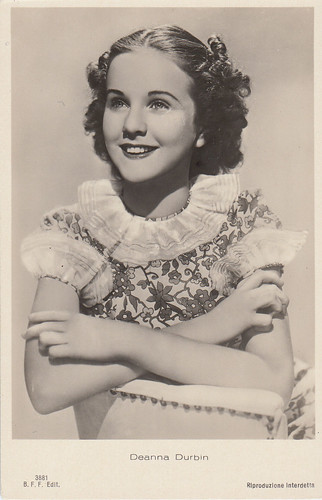
Italian postcard by B.F.F. Edit. (Ballerini & Fratini, Firenze), no. 3881.

French postcard by Chantal, no. 523. Photo: Universal Films.
A singing sensation
Deanna Durbin was born in Winnipeg (Canada) on the 4th of December 1921 to English-born parents and, when she still was a baby, her family moved to California. Blessed with a beautiful singing voice since childhood, she began to take voice lessons at the age of 10.
In 1935, she signed a 6-months contract with M.G.M. and only made one movie for them, the musical short Every Sunday (1936), in which she appeared with another promising youngster, Judy Garland.
M.G.M. let her option lapse and Universal signed her. Producer Joe Pasternak quickly realized the young girl’s potential and decided to showcase her talents in Three Smart Girls (1936). During filming, she also sang regularly on the Eddie Cantor weekly radio program and became a sensation.
When Three Smart Girls was released, her engaging personality, her infectious smile, and her graceful soprano singing were a hit with the audience and she emerged as a star.
Her follow-up, One Hundred Men and a Girl (1937) was also a huge success.
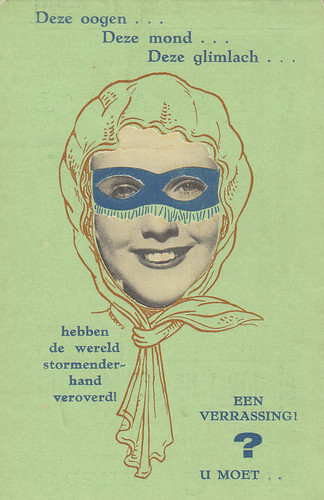
Dutch three-part postcard, part 1. Promotion card for One Hundred Men and a Girl (Henry Koster, 1937). Caption: These eyes... This mouth... This smile... have taken the world by storm! It's a surprise! ? You must...

Dutch three-part postcard, part 2. Promotion card for One Hundred Men and a Girl (Henry Koster, 1937). Caption: come and admire the star of 'Three Smart Girls' in her latest film 'One Hundred Men and a Girl'. The highlight of the Universal production. From 14 October in Tivoli. Great cast: Leopold Stokowski, America's greatest conductor with the world-famous Philadelphia Symphony Orchestra, Adolphe Menjou, Alice Brady, Mischa Auer. Send this postcard to your acquaintances with your opinion of this film. They will be grateful to you.

Dutch three-part postcard, part 3. Photo: Universal. Promotion card for One Hundred Men and a Girl (Henry Koster, 1937).

Belgian postcard. Caption: New Universal Pictures Star.
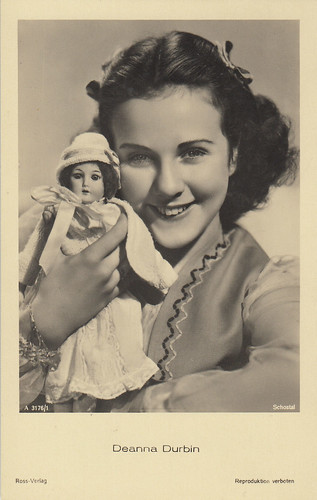
German postcard by Ross Verlag, no. A 3176/1, 1941-1944. Photo: Schostal.

British postcard in the Colourgraph series, London, no. C309. Photo: Universal.

Norwegian postcard by Brodrene Halvorsen, no. 6. Photo: Ray Jones / Universal.
Universal’s golden girl
Deanna Durbin’s popularity was said to have saved Universal from bankruptcy in those days.
After Mad About Music (1938), That Certain Age (1938), and Three Smart Girls Grow Up (1939), Deanna received her first screen kiss in First Love (1939).
In 1939, she was given a special juvenile Oscar for her "significant contribution in bringing to the screen the spirit and personification of youth". Just as it had been the case for Shirley Temple, her fame was such that, from 1938 to 1941, Deanna Durbin dolls were produced by Ideal Toy Company.
She was gradually eased into more mature roles and her transition to adult star went smoothly thanks to It’s a Date (1940), Spring Parade (1940), Nice Girl? (1941), It Started with Eve (1941), The Amazing Mrs. Holliday (1943), Hers to Hold (1943), and His Butler’s Sister (1943).
She then tried her hand at a dramatic role in Robert Siodmak’s Film Noir Christmas Holiday (1944). But her fans were not too pleased to see their beloved Deanna as a troubled nightclub singer and hostess and, in her next film, Can’t Help Singing (1944), she was back to her usual lighter persona.
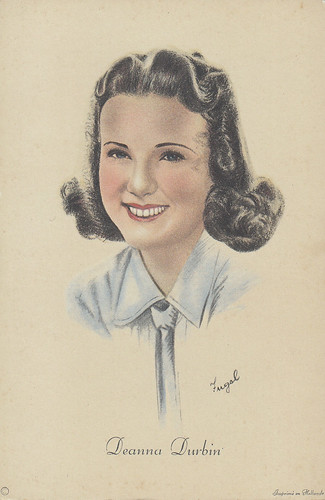
Dutch postcard by J. Philip Kruseman, The Hague. Image: Fugel (?).
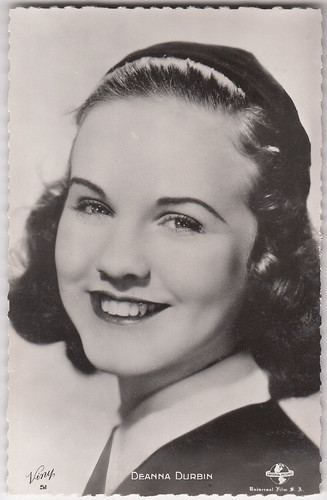
French postcard by Viny, no. 51. Photo: Universal Film S.A.
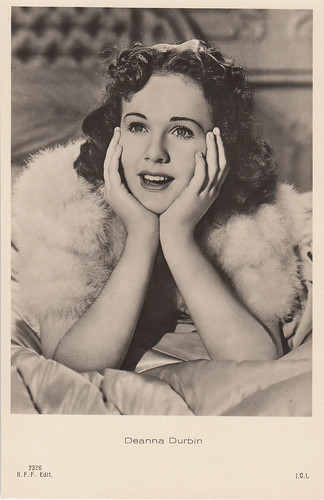
Italian postcard by B.F.F. Edit., no. 2326. Photo: I.C.I.

Italian postcard by B.F.F. Edit., no. 2377. Photo: I.C.I.

Italian postcard by B.F.F. Edit., no. 2299.
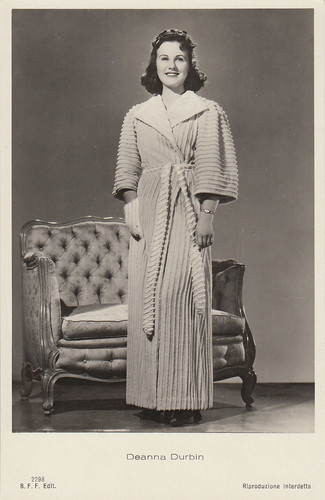
Italian postcard by B.F.F. Edit., no. 2298.

Italian postcard by B.F.F. Edit., no. 2416. Photo: I.C.I.
Box office decline
Deanna Durbin again attempted a more challenging part in the mystery-comedy Lady on a Train (1945) but audiences definitely preferred her in escapist musicals.
Universal obliged by putting her in Because of Him (1946), I’ll Be Yours (1947), Something in the Wind (1947), and Up in Central Park (1948).
However, this didn’t prevent her box office clout to wane in the second half of the 1940s although she was at that time one of the top-salaried women in Hollywood.
Her filmography ended with For the Love of Mary (1948) and her Universal contract expired in 1949.

Dutch postcard by M. B. & Z. (M. Bonnist & Zonen, Amsterdam), no. 1076. Photo: Universal.

British postcard in the Colourgraph series, London, no. C400. Photo: Universal.

French postcard by Ed. Jules Ferry, no. 49. Illustration by Nicolitch.

French postcard by Erpé, no. 659. Photo: Universal Film.

Latvian postcard by IRA, Riga, no. 2997. Photo: Atlantik. Deanna Durbin and Jackie Cooper in That Certain Age (Edward Ludwig, 1938).

Dutch postcard by M. Bonnist & Zonen, no. 115. Photo: Universal. Deanna Durbin and Melvyn Douglas in That Certain Age (Edward Ludwig, 1938).
Deanna Durbin’s retirement
Tired of her stereotyped roles and stuck in a wholesome image that she considered having nothing to do with her real personality, Deanna Durbin left show business forever.



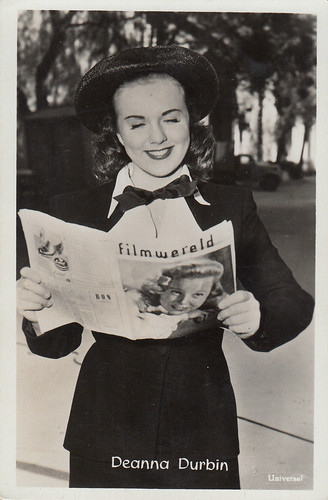



2 comments:
Thank you for this. She was truly one of my favorites.
Thanks, Maria! We'll let Marlene know.
Post a Comment